In 2014, the Board of Directors of ROSSETI approved the Personnel and Social Policy formulated with the aim of employing personnel sufficient to achieve the current and long-range goals of electric grid companies, including the goals contained in the Strategy for Development of the Electric Grid Sector of the Russian Federation. The Policy is applied as the policy document establishing electric grid companies’ priorities and defining the areas of their activities in human resource management, human resource development, and social management. The provisions of the Policy form the basis for the personnel policies of subsidiaries.
The personnel policy of the ROSSETI Group is aimed at increasing workforce productivity, improving the social security of employees, and creating a favorable socio-psychological climate within the Company
The staff on the payroll of ROSSETI SDCs engaged in the grid business was 217,900 people in 2014 (221,600 in 2013). Changes in the number of the Group’s employees were due to downsizing the personnel responsible for the supplier of last resort functions and optimizing the number of administrative personnel.
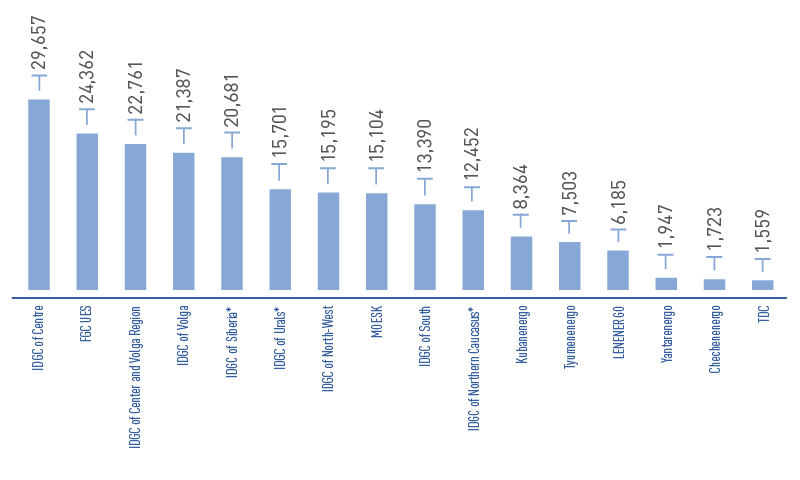
* Including results of subsidiaries and dependent companies of ROSSETI SDCs engaged in the grid business.
As of December 31, 2014, workers accounted for the largest part of the ROSSETI Group’s workforce (53%).
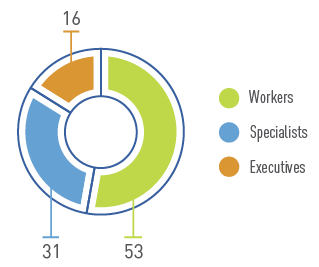
Principles of the Personnel Policy
The key goals of the Personnel and Social Policy that are intended to ensure the attainment of the ROSSETI Group’s strategic targets are as follows:
- plan personnel requirements by ensuring the availability of reliable information about the current and forecasted quantitative and qualitative workforce requirements, provided that such information is necessary and sufficient for electric grid companies to accomplish their goals;
- provide electric grid companies in a timely manner with required personnel having necessary qualifications;
- ensure electric grid companies’ high personnel efficiency and their workforce productivity growth.
The basic principles of pursuing the Personnel and Social Policy in the ROSSETI Group include:
- introducing unified approaches to human resource management into electric grid companies with due consideration to the regional particularities of their operations;
- ensuring that mechanisms for implementing the Policy conform to Russian and foreign best practices and standards in personnel management to the fullest extent possible;
- providing a package of areas and methods of personnel management to enable electric grid companies to adapt quickly and effectively to corporate and external changes;
- creating a uniform personnel environment, employing uniform techniques, and using common information resources to improve personnel management efficiency and ensure cost reduction;
- providing employees with equal opportunities and preventing discrimination for any reason;
- treating employees as human capital assets, creating the conditions for their maximal career development, and investing in personnel development;
- creating the conditions where professionalism, effectiveness, motivation for professional growth, and the sharing of corporate values are the necessary requirements and only guarantee for career development в electric grid companies;
- helping electric grid companies acquire a reputation as a socially responsible and preferable employer to make them more attractive to highly qualified personnel.
Human Resource Development Programs
In meeting electric grid companies’ needs for staffing, priority is given to current employees and their development in accordance with the qualification requirements, the recruitment of young professionals with specialized professional education and, in the case of senior management positions, the industry’s best professionals hired on a competitive basis.
The key mechanism for planning a career is the establishment and development of personnel reserves
Personnel reserves are established for the positions that require a long time of training and continuity:
- senior positions up to the level of line managers (heads of substations/electric grid districts) — managerial personnel reserves;
- positions whose effective performance requires profound knowledge of the electric grid sector’s particularities — key personnel reserves.
Identifying talented young people and creating the conditions for enabling the electric grid sector’s young professionals to realize their potential to the fullest extent are part of establishing the youth personnel reserve. Over 80% of managerial positions are covered by the personnel reserve, with every tenth reserve member appointed to a higher position in 2014.
The personnel training and development system of electric grid companies is focused on enabling employees to realize their potential and develop as professionals with due regard to the future needs of companies and changes in the external environment. The personnel training and development system is based on the principles of timeliness, consistency, and continuity.
A substantial advantage of the corporate training system is the availability of a network of regional training centers that provide satisfy the basic needs for production personnel training. These are establishments licensed to provide additional professional training and having lecture halls, laboratories, and electric-grid training grounds.
The training, retraining, and advanced training programs for employees are planned in accordance with the following approaches:
- ensure the unconditional fulfillment of the requirements for mandatory training/certification for electric grid companies’ personnel (Personnel Development Rules for the Electric Power Industry, the requirements set by the Federal Service for Environmental, Technological and Nuclear Supervision of the Russian Federation, etc.);
- give priority to the training programs that support the introduction of new techniques, technologies, and new activities aimed at the development of personnel’s innovative competencies under corporate training programs and under development programs for executives and reserve members;
- achieve the targets of annual personnel training: at least one-third of the staff on the payroll;
- keep a balance between employees’ work hours and personal time in organizing training.
Overall, the training, retraining, and advanced training programs, including training at corporate training facilities, was attended in 2014 by about 240,000 people, or more than 100% of the staff on the payroll of the ROSSETI Group. Off-the-job training was provided for 105,000 people, or about 50% of the Group’s personnel, which is comparable to the level of 2013 (111,000 people).
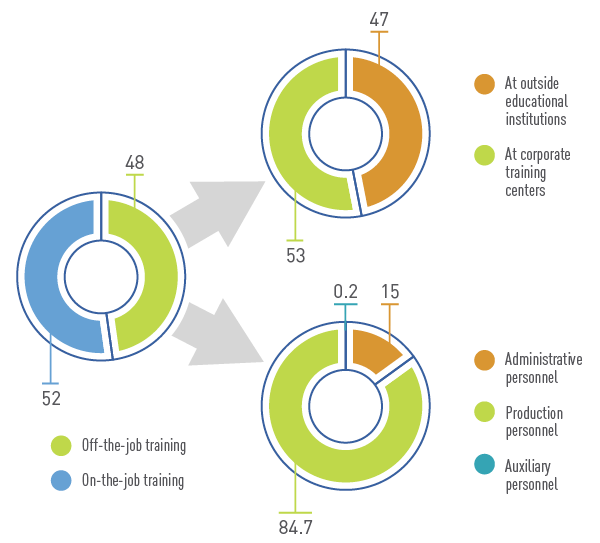
Most of the ROSSETI Group’s employees are production personnel (85%), which, coupled with the need to unconditionally comply with the requirements for mandatory training/certification for electric grid companies’ personnel, results in the fact that more than 80% of trained employees are production personnel.
The effectiveness of measures aimed at human resource development and cooperation with the educational establishments selected as base institutions in the regions where the ROSSETI Group operates is confirmed by positive changes in the qualitative characteristics of personnel:
- the decreased share of employees without professional education
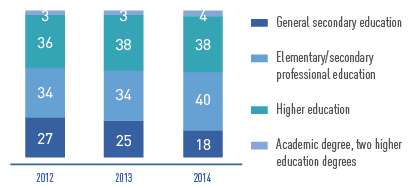
- the age characteristics of personnel remain unchanged
The average age of the ROSSETI Group’s employees is 42 years, the same as in 2013. The share of employees aged under 35 is almost one-third, while 50% are the most active employees (25 to 45 years old).
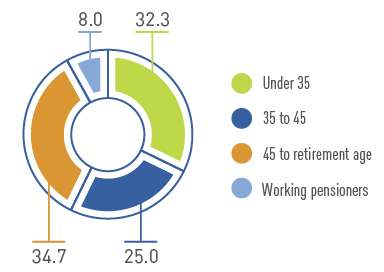
An important aspect of staffing is to carry out measures to enhance the prestige of working in the electric power industry and promoting the brand of electric grid companies as a preferred employer. These include not only information campaigns that introduce potential employees to the goals, objectives, values, priorities, and opportunities offered by the ROSSETI Group, but also systemic and multidisciplinary projects:
- the development of student labor brigades as an instrument for attracting young people to the industry and ensuring practice-oriented training; in 2014, the fifth season of work at electric grid facilities, 1,560 students worked in 101 student brigades;
- for the first time, the year 2014 witnessed the international format of the Youth Forum as part of the St. Petersburg International Economic Forum: along with companies representing the Russian electric grid sector, the event was attended by teams of electric utilities from Germany, France, Italy, Moldova, Kazakhstan; the goal of the project is to create an international communication platform facilitating the expansion of ideas of electric grid companies’ young professionals about current development trends in the energy sector in Russia and in the world;
- projects were implemented to identify the scientific and innovative potential of employees: the ROSSETI team of employees and experts took part in the International Forum of Young Power Engineers and Industrialists (Forsage 2014); the International Energy Efficiency and Energy Saving Forum (ENES 2014) held the contest “From Idea to Introduction” among young professionals’ projects.
ROSSETI’s activities in human resource development received the award “Creating the Future” from the 1st All-Russian Contest Among Employers’ Best Practices of Dealing with Children, Youth and Personnel Reserves.
